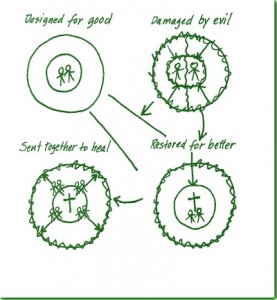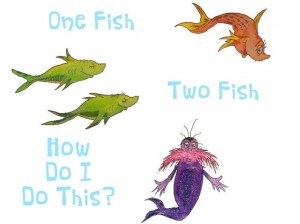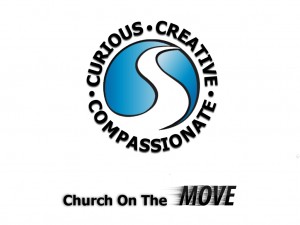
Hello: My Name Is Sycamore Creek Church – Compassionate
January 18/19, 2015
Tom Arthur
Peace friends!
You never know who will show up for worship. What would happen if Lady Gaga showed up for worship? Grandview United Methodist Church in Lancaster, PA recently had that experience. One of Lady Gaga’s family members was being baptized and she was there to participate. So what would happen if she showed up here? What if coach Izzo walked in the door? And coach Beilein? Let’s amp it up a bit. What if Barak Obama walked in the door? What about George W. Bush?
Here’s what I hope would happen: No matter who you are, where you’ve been, what you’ve done, or where we encounter you, we’re going to do our best to show you God’s compassion. Hello: My Name Is Sycamore Creek Church and I’m compassionate.
OK, those scenarios were a little off the wall, right? But here are some that are more likely to happen.
- You’re driving down the street and someone is standing on the corner asking for help.
- Your child moved out of the house to live on his/her own, but made some not-so-wise choices and now wants to move back in.
- You’ve just attended worship and are enjoying hanging out in the Connection Café catching up with a good friend when you notice just over their shoulder, someone you haven’t seen before at SCC who is standing by themselves.
- You show up for worship one day and realize that there are all kinds of people who attend worship that you would never naturally choose to hang out with.
What do these situations have in common? They all have to deal with a basic question: How do we show God’s compassion to those around us?
Here’s a basic problem I want to deal with today. Christians have been following a lie. The lie is that my faith is about me and Jesus. Here’s how the church has traditionally described what its mission is about:

We are stuck in our sin and this leads to death. When we ask Jesus to be our Lord and Savior we cross over a bridge that gets us to a Holy God and eternal life. Life is now good. Me and Jesus. Thus, the mission of the church is to get people to walk over the bridge of Jesus so that they have eternal life with God.
Now there isn’t anything particularly wrong with this, except that it is woefully incomplete. It doesn’t go far enough. It neglects everyone else around you.
Here’s a better illustration of what the church is all about:

I think we all agree that the world isn’t as it should be. All kinds of things are wrong with this world. Things aren’t as they should be. Christians believe that’s because God created and designed the world for good, but it was damaged by evil. We focused on our own needs to neglect the needs of others. The good news is that God didn’t throw us out and start again. He sent his son, Jesus, into the world to restore it for better. He showed us how to live and gave us his power to live that way. He did this in large part by creating a community of people who are seeking to follow his way. Now it would be really nice to just stay in that bubble of a community, but Jesus sent us out into the world together to heal. So it’s not just about Jesus and me. It’s about Jesus and us and all the world. Thus, the mission of the church is to invite people to be restored for better and then sent out together into the world to bring healing, to be part of the solution rather than the problem. We can’t do this on our own. That’s what got us into trouble in the first place. We need the resources of God in Jesus.
So here at SCC we seek to be compassionate, to bring healing together to the world through Jesus. No matter who you are, where you’ve been, what you’ve done, or where we encounter you, we’re going to do our best to show you God’s compassion. But it’s not always clear how to show God’s compassion. Here are three hooks of compassion here at SCC.
1. Fiercely Focused on the Guest
In the book of Hebrews, we read:
Don’t forget to show hospitality to strangers, for some who have done this have entertained angels without realizing it!
~Hebrews 13:2 NLT
The guests who show up at our events just might be angels! So you better make sure they don’t go unnoticed. The Rule of St. Benedict, the basic instructions for Benedictine Monasteries tells monks and nuns to “Let all guests who arrive be received like Christ.” SCC treats our guests like we would treat an angel or Christ if they showed up.
There are some important ways we think and talk about this focus. First, we talk about guests, not visitors. Guests are people you plan for and expect. You’re excited when they show up. We were recent guests at Sarah’s parents for Christmas. When we showed up they were prepared. They had all of their grandkids’ favorite toys out. They had their rooms all prepared. The ornaments on the tree were up out of reach. They had gone shopping and had enough food to cover the visit and not only enough but favorite food. They were glad we came and they prepared for it. A visitor is someone who comes to the door unexpected and unwanted. The Kirby salesman is a visitor. You’re polite (most of the time) but you want to get rid of them as fast as possible. At SCC, new people are guests, not visitors. We plan for them. We learn what they like and want and we prepare for it. We are glad they showed up. We do everything we can to make sure they experience an environment where they can encounter God. We are fiercely focused on the guest.
Second, we practice the 5-10-Link rule. Five minutes before the service and five minutes after the service pay attention to the people within ten feet of you that you don’t know. Then link with them and link them to someone else. If you find out that they are a computer programmer, introduce them to another computer programmer in the room. If you find out they like comic books, introduce them to someone else who likes comic books. If you find out they’re hungry, introduce them to someone else who is hungry.
Third, be careful to protect my time as the pastor with guests. Sometimes I get swamped right after worship with a lot of people who want to talk to me. Can you wait five or ten minutes? I’m not going anywhere. If I happen to be talking to you and a guest walks by, I will stop our conversation to greet the guest. Sometimes I can do that gently. But sometimes it’s abrupt. I was talking with a regular attender the other day when a first-time guest was walking by. I ditched him so hard and it was so abrupt, that I called him up the next day to apologize. He understood. I was practicing the 5-10-Link rule myself.
We practice compassion at SCC by being fiercely focused on the guest.
2. Diverse friendships
Paul, the first missionary of the church, wrote a letter to the church at Colose that we now have in our Bibles as the book of Colossians. Here’s what he said:
Don’t lie to one another. You’re done with that old life. It’s like a filthy set of ill-fitting clothes you’ve stripped off and put in the fire. Now you’re dressed in a new wardrobe. Every item of your new way of life is custom-made by the Creator, with his label on it. All the old fashions are now obsolete. Words like Jewish and non-Jewish, religious and irreligious, insider and outsider, uncivilized and uncouth, slave and free, mean nothing. From now on everyone is defined by Christ, everyone is included in Christ.
So, chosen by God for this new life of love, dress in the wardrobe God picked out for you: compassion, kindness, humility, quiet strength, discipline.
~Colossians 3:9-12 The Message
It tends to be easiest to show compassion to those who are like us with the same labels. But Paul believes that in Christ we build diverse friendships. White with black and Hispanic. Rich with poor. Educated with the uneducated. Employed with the unemployed. Gay with straight. You see, it’s easy to stereotype people who are different than we are when we don’t know them. But when they are our friends, we are more likely to be compassionate. We “put on” compassion when we build friendships with people who are different than we are.
I was talking with someone in our church the other day who is not by American standards rich, but they have a good job that takes care of their basics and leaves money to have fun with. This person was telling me how when they first came to SCC they really wrestled with those folks here who are homeless or near homeless. They wrestled with building friendships with the working poor. But over time this person has realized how special and unique it is to voluntarily be in a community where you’re building friendships with people who are different than you are. Diverse friendships at SCC helped this person put on compassion.
3. Compassion Service
So far we’ve looked at two hooks that SCC hangs their compassionate hat on. The third hook is compassionate service. Matthew, one of Jesus’ followers, tells the story of a moment when Jesus encountered a crowd. He says:
When he saw the crowds, he had compassion for them, because they were harassed and helpless, like sheep without a shepherd.
~Matthew 9:36 NLT
I think there are two ways that Jesus understands people as helpless, like sheep without a shepherd. At one point he says, “Blessed are the poor” (Luke 6:20), or those who have physical needs. At another time he says, “Blessed are the poor in spirit” (Matthew 5:3), or those who have spiritual needs. At SCC we seek to show compassion by meeting the physical needs of those around us as well as the spiritual needs.
We meet physical needs in our church primarily through our small groups. Each of our small groups is encouraged to do one service project each semester. They choose what they do and we advertise it to the rest of the church. We don’t have just one mission team. We have twenty-plus missions teams!
But we seek to show God’s compassion no matter where we encounter it, and we often don’t get to schedule opportunities for compassion. They just happen. We’re walking down the sidewalk and someone asks for help. I’ve been asked many times for tips on how to respond to people who ask for help on the street corner or elsewhere. Here’s my approach. First, be non-judgmental. There’s a lot of judgment going around about whether someone asking for help on the street corner is legit or not. I don’t know, and you don’t either. What would it take in your life for you to stand on the street corner and ask for help? A lot. So let’s not be judgmental. Second, I have a hard time responding to people who I’m driving by, but when I drive by someone over and over again and see the same person over and over, I’m inclined to stop and offer to buy them a meal. I ask them what they’d like, and then I go buy it and come back and sit and talk with them. I begin building a diverse friendship. If someone asks me for help as I’m walking down the sidewalk, I offer to go with them right then and buy them what they asked for. They often will decline only wanting money. I tell them that I can’t give them money, but I will buy them what they asked for. Sometimes they take me up on the offer, sometimes they don’t. Either way, I seek to not be judgmental. I seek to show compassion by meeting physical needs.
But we also seek to meet spiritual needs. I’ve told you that we hired a demographic expert named Tom Bandy. About a month ago he helped us get to know our neighborhood. We found out that the largest group we are currently reaching is a group called “Singles and Starters.” Experian, the credit rating company, describes them as “young singles starting out, and some starter families, in diverse urban communities.” SCC is currently made up of about 14% Singles and Starters, but just around our new Sunday venue is about 28% Singles and Starters. When it comes to worship they are looking for missional connection, educational, and coaching worship styles. Then it comes to our “Christian Education” they are looking for topical and peer group options. When it comes to small groups they want rotated leaders rather than designated leaders. They have a lot of questions about health and quality of life. These are some of their spiritual needs. We seek to be compassionate by meeting the needs not just of those within the walls of SCC but also those in our community. Singles and Starters aren’t necessarily aware of their own spiritual needs, but they are open to surprises. One example of this came when Joanna began attending our Church in a Diner with her mom. Listen to how she describes being surprised by having a spiritual need met.
Hello: My name is Sycamore Creek Church. I’m curious, creative, and compassionate. What’s your name?
Prayer
God, help us put on compassion by being fiercely focused on the guest, by building diverse friendships, and by meeting the physical and spiritual needs of our community. Let us show your compassion to whoever walks through our doors or whoever we meet whenever we meet them. May this be true of us in the name of your son, Jesus. Amen.



Recent Comments